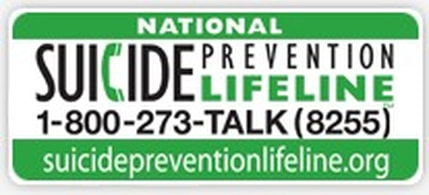Are you sad or irritable most days? Have you lost interest in most things? Are you having a hard time getting motivated or find that you don't have any energy? Having difficulty with sleep?
These can be symptoms of depression. While many people will experience sadness and periods of feeling down, others may experience increasing and worsening of symptoms over an extended period of time that interfere with work/school, relationships and overall daily functioning.
The National Alliance of Mental Illness (NAMI) reported that "An estimated 16-million American adults, almost 7% of the population, had at least one major depressive episode in the past year (NAMI Mental Health Conditions Facts Sheet, NAMI Website).
THE SYMPTOMS OF MAJOR DEPRESSIVE DISORDER INCLUDE:
Depressed mood most of the day for at least 2 weeks
Loss of interest in most activities, most days
An increase or decrease in appetite, with weight gain or loss
Sleeping too much or not enough
Slowing or increased physical activity
Loss of energy, fatigue
Lack of motivation
Feeling unworthy or hopeless
Feelings of excessive guilt
Problems with concentration or decision making
Thinking about or making plans to end your life (or past attempts)
THERAPY CAN HELP YOU MANAGE SYMPTOMS OF DEPRESSION
BENEFITS OF THERAPY MIGHT INCLUDE:
Improved mood
Better sleep
Improved appetite
Increased energy and motivation
Feeling better physically
Feeling more hopeful
More positive thinking
Improved thinking patterns
Use of healthier coping skills
Improved problem-solving and decision-making skills
Improved stress management
Enjoying pleasurable activities again
Improved quality of life
Increased assertiveness
Increased confidence
Improved self-esteem/self-worth
Better self-care
Improved/healthier relationships
DURING THERAPY I USE COGNITIVE BEHAVIORAL THERAPY (CBT) TO TREAT DEPRESSION. THIS INVOLVES:
Increasing your knowledge about depression
Identifying your symptoms and things that affect these
Learning about the connection between your thoughts, feelings and behaviors and how this impacts your depression
Monitoring your thoughts, feelings and behaviors to identify patterns of distorted thinking related to your depression
Learning to challenge and change those patterns
Learning to focus on the positives rather than the negatives
Developing healthy coping and problem-solving skills to manage your depression
Developing the skills to be assertive with others
Having thoughts of harming yourself or have made a plan to do so?
Please reach out, assistance is available.
Talk to family or a friend that you trust to get you assistance
Speak with your doctor or go to the nearest ER where they can assist you.
Call The National Suicide Prevention Lifeline (1-800-273-8255) ANYTIME, day or night.
If you are interested in finding out more about therapy for DEPRESSION, contact me for a complimentary 20-minute phone consultation to discuss your situation and how therapy may be beneficial. I understand that it may take a lot of energy to motivate yourself to make the call and I honor your courage. I look forward to connecting with you!



